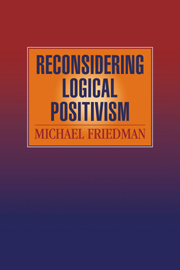5 - Carnap's Aufbau Reconsidered
Published online by Cambridge University Press: 05 June 2012
Summary
Rudolf Carnap's Der logische Aufbau der Welt, written largely in the years 1922–5 and published in 1928, is generally–and rightly–regarded as one of the most important classics of twentieth-century positivist thought. But what exactly is the importance of this great work? Precisely where does its significance lie?
The most widely accepted view of this question, I think, runs as follows. Central to twentieth-century positivism is the doctrine of verificationism – the doctrine that the cognitive meaning of all scientific statements must ultimately consist in their consequences for actual and possible sense experiences. And it is this radically empiricist doctrine, above all, that forms the basis for the notorious antimetaphysical attitude of twentieth-century positivism: in virtue of their unverifiability, metaphysical statements are deprived of all cognitive meaning as well. Yet this radically empiricist program also requires a positive construction, for one must show how the non-metaphysical statements of science and everyday life are actually translatable into terms referring only to sense experiences. In other words, twentiethcentury positivism requires a phenomenalistic reduction.
The Aufbau, on this reading, is important primarily for its attempt at just such a phenomenalistic reduction:
Radical reductionism, conceived now with statements as units, set itself the task of specifying a sense-datum language and showing how to translate the rest of significant discourse, statement by statement, into it. Carnap embarked on this project in the Aufbau.
(Quine 1951/1963, p. 39)- Type
- Chapter
- Information
- Reconsidering Logical Positivism , pp. 89 - 113Publisher: Cambridge University PressPrint publication year: 1999
- 4
- Cited by

